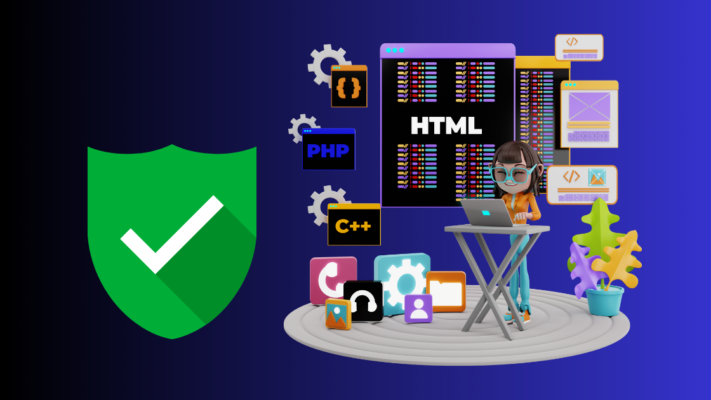Don’t you think the safety of your ecommerce platform is relevant in the current era? Definitely, yes! As hacking and cyber attacks are rapidly increasing nowadays, it’s very important to implement efficient security measures with your e-commerce service. To protect your platform and customers from cyber threats, adapt safety strategies during your ecommerce web development process. So, now in our latest blog, let’s explore some of the essential tips and best practices to ensure secure ecommerce web development.
Building Trust: Best Practices for Secure eCommerce Web Development
1. Use HTTPS for Secure Communication
One of the first moves in the context of secure ecommerce web development is to enable HTTPS. HTTPS involves the protection of information exchanged between a user’s web browser and the server to prevent exposure to and loss of, data like credit card and personal information. This not only keeps it safe but makes people trust your web more and can increase its standing on search engines.
2. Regular Security Audits and Penetration Testing
Ecommerce web development needs periodic security assessments and penetration testing so that potential threats to the developed ecommerce sites can be discovered. The approach plays the role of exposing and fixing potential flaws in your security system before the hackers get a chance to do it. An ecommerce web development company that offers reliable security services can deliver the needed audit for your project.
3. Secure User Authentication
The implementation of secure user authentication methods is important for protecting user accounts. Use strong password policies, two-factor authentication (2FA), and, if possible, use biometric verification. These help to minimize the number of threats of unauthorized access and ensure the confidentiality of your customers’ information.
4. Keep Software and Plugins Updated
Outdated software and plugins are common entry points for cyberattacks. Make sure your ecommerce platform, along with all the plugins and extensions you use, is the most up-to-date version available. This practice is useful in fixing established threats hence facilitating a secure ecommerce web development ecosystem.
5. Implement Secure Payment Gateways
Secure payment gateways are very important for protecting financial transactions on your ecommerce site. Choose reputable payment processors that comply with PCI DSS (Payment Card Industry Data Security Standard) to ensure the highest level of transaction security. It becomes an essential factor of any custom ecommerce web development project.
6. Data Encryption
Secure data both while they are transferring and while at rest. Encrypt the customers’ data stored in your databases through the use of strong encryption methods. Encryption guarantees that no matter how of tenure the information leakage occurred, it would be useless to the attacker.
7. Use Web Application Firewalls (WAF)
Another sophisticated solution protecting your ecommerce site is a Web Application Firewall (WAF) that observes the incoming traffic. WAFs can mitigate common threats such as SQL injection, cross-site scripting (XSS), and other web application attacks hence playing a role in a secure ecommerce web development service.
8. Regular Backups
Regularly back up your website and database to a secure location. Recent backups are beneficial in case of an attack as they enable one to regain the site quickly and with little interruption. The programs for an automatic backup can assist in maintaining updated copies of your site at all times.
9. Educate Your Team
Arguably, it is crucial to train your development and management teams on security best practices. Organize periodical training sessions to adopt new security threats and measures for the employees of the organization. A knowledgeable team is a valuable resource when it comes to preserving the ecommerce web development environment from threats.
10. Monitor and Respond to Security Incidents
Make sure your business has a comprehensive monitoring plan to catch security incidents, and then mitigate them quickly. Real-time monitoring software can give you prompt notification of some irregular activities so that you can curb potential threats. Partnering with an experienced ecommerce web development services provider can enhance your incident response capabilities.
Essential Security Tips for eCommerce Web Development Success

Ecommerce web development is a constant endeavor where several strategies need to be employed and updated from time to time besides alerting the latest threats. With the help of the tips mentioned above and the help of a reliable ecommerce web development company like Bytesflow Technologies, you will be able to create a safe environment for both your platform and your customers, which is vital for the longevity and prosperity of an online business.
Whether you’re seeking custom ecommerce web development or comprehensive ecommerce web development services, prioritizing security will position your business as a trusted and reliable choice for online shoppers.
Ultimately, let it be clearly understood that security is not only about safeguarding information, but it is also tantamount to constructing a strong credibility that will foster the growth of your ecommerce.
Aparna Babukuttan is a content writer at Bytesflow Technologies who writes with passion and emotions. She has a keen interest in exploring the latest technologies and has years of experience in writing for artificial intelligence and Web3 including blockchain, NFT, metaverse, and cryptocurrency. Beyond Blockchain, Aparna also lends her expertise to crafting captivating narratives for on-demand food delivery businesses.

